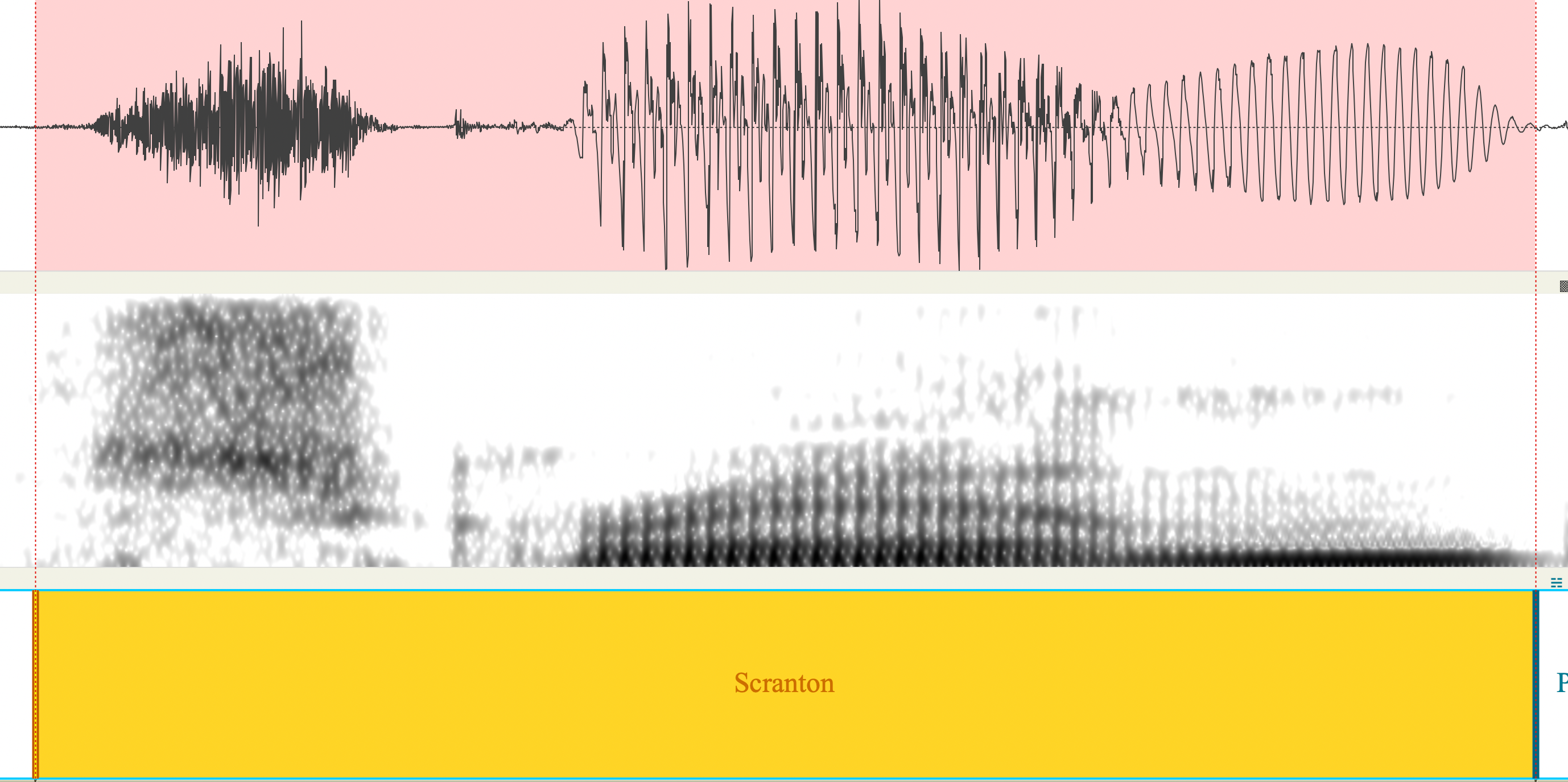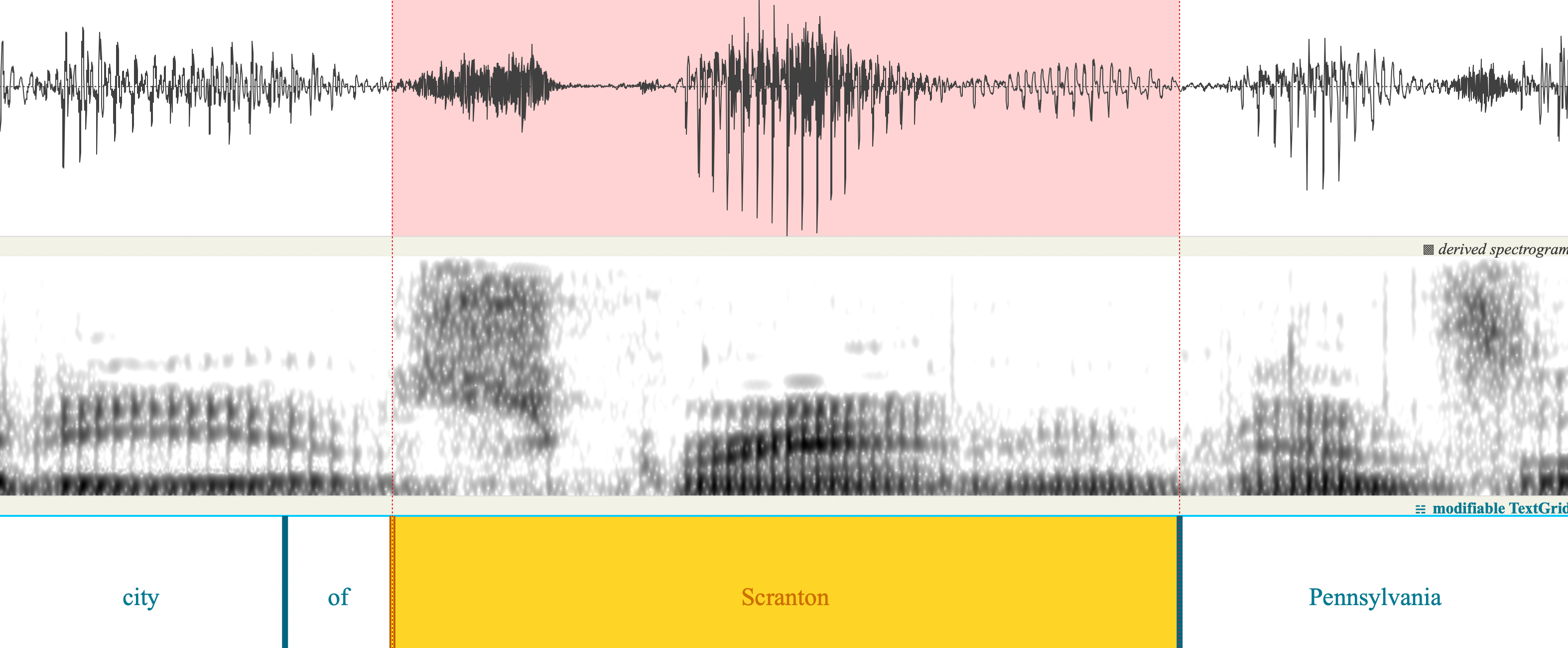"There's no T in Scranton"
« previous post | next post »
According to Jennifer Bendery, "At 81, Joe Biden Is Still The Last Guy To Leave The Party", Huffington Post 3/8/2024:
After his State of the Union speech, the president was so eager to keep talking to people he didn't care that the lights went down or that hot mics picked him up.
[…]
“Thank you, man,” said Biden, before shaking someone else’s hand and pointing at him. “You know there’s no T in ‘Scranton.’ It’s Scran-un!”
Fact-checking that claim, I did a quick scan of Shuang Li's INTERVIEW: NPR Media Dialog Transcripts dataset, which contains 3,199,859 transcribed turns from 105,817 NPR podcasts, comprising more than 10,648 hours. That dataset is just the transcripts, but some years ago, Jiahong Yuan and I downloaded the audio and aligned it with the texts. And I wrote a simple search script, so that checking stuff like this is easy.
In that corpus, Biden's assertion does check out — though as we'll see, it's not completely clear what he meant. If anyone can find the full "open mic" recording, including the pronunciation he was reacting to, please let me know.
Here's the first instance I found. And it's really pretty T-less:
Scott Horsley (from "In Kansas, Obama Invites Roosevelt Comparisons", Morning Edition 2011-12-06):
Zeroing in on the audio for "Scranton":
In fairness to the person Biden was (apparently) correcting, most Americans would perform the /t/ in "Scranton" as a bit of glottalization — a bit that was lenited to (near?) extinction in the previous example. Here's a version where more of it survives, from Don Gonyea, "Biden A Vital Surrogate For Obama On Campaign Trail", All Things Considered 12/06/2012:
Zeroing in again on the audio for "Scranton":
Locals (like Biden) are typically prone to greater lenition of the weaker aspects of their home town's phonetic implementation, wherefore (presumably) his correction…


Olaf Zimmermann said,
March 10, 2024 @ 9:07 am
Ever bin (been) to the Sheridan (Sheraton) in Tyranna (Toronto)?
Q. Pheevr said,
March 10, 2024 @ 9:47 am
Having received my prepostsecondary education in a system that placed too much faith in standardized testing, I’m afraid I will always misread “Scranton” as “Scantron” on the first pass.
cameron said,
March 10, 2024 @ 10:14 am
I've heard that city jocularly referred to as "Scrotum"
Robert Coren said,
March 10, 2024 @ 10:16 am
@Olaf Zimmermann: I believe the locals call that Canadian city "Tronna".
Victor Mair said,
March 10, 2024 @ 10:38 am
And I (from south of Lake Ontario and Lake Erie) say "tuh-rawn-toe", while Beijingers say "duōlúnduō 多倫多", Hong Kongers say "do1 leon4 do1", and Taiwanese say "to-lûn-to".
Buford Pusser said,
March 10, 2024 @ 10:43 am
Similar to the New England state of Vermawn, where a sure sign that someone is an alien "flatlander" is pronouncing the final "T" in "Vermont".
Mnemonic: "I'm a Vermonter, I'll do what I wanner." This should rhyme.
Craig said,
March 10, 2024 @ 12:06 pm
Biden's meaning was clear enough to me, and I'm not even from Pennsylvania (or anywhere near it). It reminds me a little of the word "often", which many Americans pronounce "OFF-en" (I don't know how Canadians, Brits, or Aussies say it). I, for some reason, have always pronounced it "OFT-en".
Olaf Zimmermann said,
March 10, 2024 @ 1:01 pm
@VHM Shall we dance?
mg said,
March 10, 2024 @ 3:29 pm
Come to Massachusetts and get your corrections for Woburn, Medford, and other local towns places.
J.W. Brewer said,
March 10, 2024 @ 8:51 pm
When Biden was an adolescent his family moved from Scran[t]on to the northern suburbs of Wilmington, Del., eventually settling in a house about a mile from the house I subsequently lived in in my early childhood (which commenced the year Biden left Delaware temporarily to attend law school up in Syracuse). The echt-local pronunciation of "Wilmington" omits both the /l/ and the /ŋ/, but I'm not sure if Biden's idiolect ever got that echt-local.
JPL said,
March 10, 2024 @ 9:37 pm
From the two examples you've given us, I'm wondering which of Biden's two linguistic assertions checks out, (or do both?) and what the correctee's pronunciation was, since, as you say, the "t" is already gone in the "most Americans" example (no, 2), replaced by glottal stop plus syllabic nasal continuant, while maintaining two syllables. But does the journalistic transcription, which is disyllabic, with two alveolar articulations, accurately reflect Biden's correction, or was that actually more like your example 1, where there is lenition of the stop, remaining as a mere hint, and the name almost becomes a single syllable, which is practically reduced to a glide, like some pronunciations of the name "Ann"? If it's the former, does that check out with the local custom?
Jenny Chu said,
March 10, 2024 @ 11:08 pm
When I graduated from college, my first job was a bit far afield. I had the following conversation several dozen times …
"Where will you be going after graduation?"
"Tirana, A-"
"Oh, Toronto's a great city; you'll love Canada!"
"–lbania. Not Toronto, Tirana."
"Where?"
… meaning that to this day, I still make an effort of saying "Tee-rah-nah" and "Toe-ron-toe" for the two cities. (The non-IPA transcription is my attempt to show the over-the-top way I distinguish between them).
John Swindle said,
March 11, 2024 @ 4:43 am
I hope Toronto and Tirana at least have a sister-city relationship.
Mark Liberman said,
March 11, 2024 @ 5:06 am
@JPL: "But does the journalistic transcription, which is disyllabic, with two alveolar articulations, accurately reflect Biden's correction, or was that actually more like your example 1, where there is lenition of the stop, remaining as a mere hint, and the name almost becomes a single syllable, which is practically reduced to a glide, like some pronunciations of the name "Ann"? "
In fact, on reflection, I think there's another analysis to consider.
There are two very different things that (some?) Americans can do to medial /nt/ clusters between a stressed syllable and an unstressed syllable.
Where the final syllable is a syllabic /n/, the /t/ usually becomes a glottal stop (or a variably weak glottalization), just as in "button". But in other cases, e.g. in "winter", the /t/ voices and flaps, and variably assimilates with the reflex of the preceding /n/, so that "winter" becomes homophonous with "winner".
So I wonder whether (for some speakers) the /t/ in "Scranton" might be treated like "winter" (or "phantom") rather than like "button".
Robert Coren said,
March 11, 2024 @ 9:05 am
@Craig: There's an extended sequence of dialogue in Gilbert & Sullivan's The Pirates of Penzance that depends on confusion between the words "orphan" and "often", which suggests that at least some, and probably most, Victorian-era speakers of British English omitted the /t/ in the latter.
Philip Anderson said,
March 12, 2024 @ 8:08 am
The usual British pronunciation is generally OFF-en, although some people do pronounce the ‘t’ because it’s written. A ‘t’ doesn’t sound wrong to me in ‘often’, but does in ‘soften’.
Pronouncing ‘often’ like ’orphan’ sounds strange to me, but that would have been the case at the time (according to Wiktionary):
RP: /ˈɒf(t)ən/, (East Anglia, Historical RP) /ˈɔːf(t)ən/
Lindsay Costelloe said,
March 19, 2024 @ 12:52 am
@Robert Coren: The late Queen Elizabeth pronounced often without the T as does the current king, I think. Growing up in Sydney, Australia in the 1960s, the T-less pronunciation was most common and T pronouncers chastised by school teachers. Now, though, the T pronunciation is taking over and is even heard on the ABC, the national broadcaster. I retain the T-less pronunciation myself.
David in Tokyo said,
March 21, 2024 @ 10:19 am
There was a US commedy movie (The Russians Are Coming?) in which a Russian sub runs aground off Gloucester. On the Russians' map, it's spelled phoneitcally "gloster" in Cyrillic, but the actors playing the Russians reading the map _say_ "gloukester".
Growing up on Beacon Hill in the late 50s through 60s, mother (who grew up in West Peabody, 20 miles north of Boston) insisted she could tell what town any delivery person who showed up on our doorstep was from. She was often correct, although I suspect she cheated, i.e. didn't play the game if she couldn't get the answer.
Patty O'Brien said,
March 22, 2024 @ 5:47 pm
I'm no fan of Biden, but that Scranton has no "t" (for the locals) might be the most lucid thing he's said in his presidency.
The audio examples are from NPR, whose anchors have a college accent all their own. They are never going to get close to what Biden is really referring to about the mispronunciation. Him saying there is no "t" in Scranton is, to my mind, shorthand for all of what is still being butchered (according to the locals) in any such audio clip you will find. Biden may not be reacting so much to the specifics he's hearing when he makes this statement, but to the larger problem of having to hear non-locals utter your hometown name, which in his case he knows with certainty will be incorrect before they even begin.
The "Scra-" start of the word is about all any outsider has ever managed to get right. The NPR anchors still have loads of "t" in there, to my ear, compared to the local standard.
I'm from Philadelphia, but many decades ago spent some childhood summers just outside Scranton, hanging out with a local girl who lived on a farm there. We had a running joke of how to pronounce Scranton, with her trying to teach us the correct way by mercilessly repeating the word so many times every summer that her pronunciation still echos in my head to this day. I'm not sure there is a transliteration scheme that could capture the second half of the word. Time and effort come to almost a complete stop when you hit the first "n," such that it's not actually uttered in full but held within, then you have to turn around and utter a vowel of some sort without letting go of the arrested "n" until you start utterance of this second vowel. And the second vowel is not an "o," nor quite the "u" written above either. Maybe closer to an "e" of sorts, as in the last syllable of "taken."